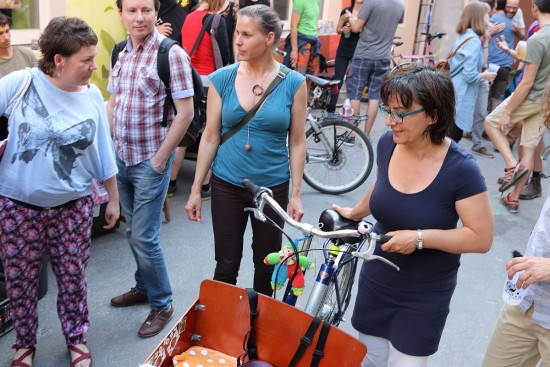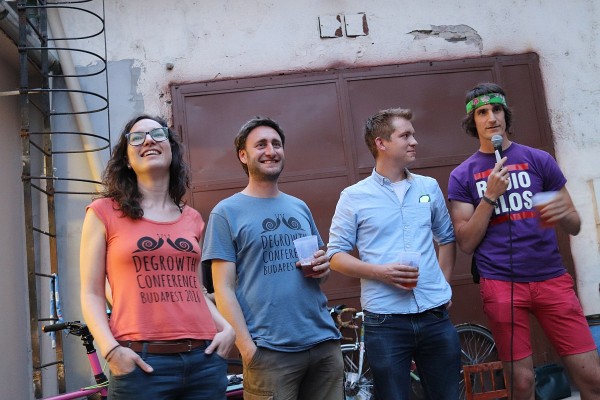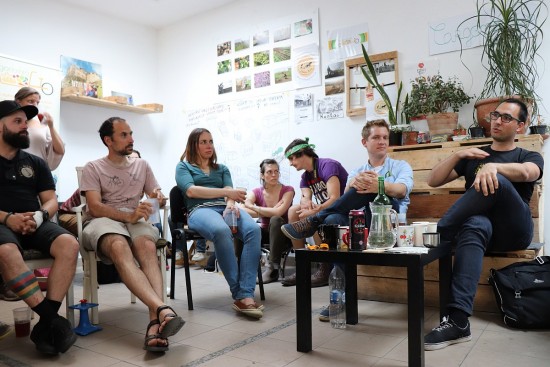celebrating the birth of the cargo bike culture

Our everyday perception of cargo bikes is something like a new elite thing for cyclists, the coolest of the cool, and normally we might not suspect that this is the new front of a possible cyclist revolution which we keep hoping to break out at full force since 1992, the birth of Critical Mass movement. As we could learn at the discussion, the campaign for achieving an equal right for cycling is now happening, like a block to block war, right in the head of the everyday citizen, and right at the ultimate question: “okay, but how do I carry stuff?”, aka “how do I take my kids to kindergarten?”, “what if I have to transport a huge tv set?”, etc.

This is, they said, where the decision turns this or that way, YES or NO, as for whether one will eventually buy a car or not. So, this banally practical question – “but how do I take the kids to school?” – affects our lives in our cities crucially. And it is precisely here where the cargo bikes come into the picture. Cause they can be the answer! They can make the breakthrough happen! Actually, their mere presence in the streets is already mind-transforming, cause they spread the news that “it is possible!!”, you can take your kids to the kindergarten, no problem! You can go to the super/hypermarket and buy stuff up to about 60/80 kilograms or even more (some cargo bikes can take 200 kg), and take it all home, regardless whether an entire family needs to buy so much stuff for an entire week or month.
That is to say, our relation to cargo bikes is crucial. Cause as long as we need the cars without question, cycling will remain for the trendy youth, or the “sorcerer” type of grownups, and tourists. But how can cargo bikes spread? How could there be more and more of them? How could more and more people be persuaded to use cargo bikes instead of cars when we are exposed to car ads in just about every minute? That is the question... which as of now, is still open.

The usual trend-setting tactic, assuming that the early adapters will be sooner or later followed by the early majority (according to the Rogers curve), almost completely fails here, cause this decision is like converting to a new religion, not to mention that cargo bike shops don't really exist, at least not like car dealers. There are only cyclist workshops, bicycle developers, cool cyclists who are into designing and building cargo bikes, and we can basically go to them to talk about a building project. All bikes are usually build uniquely, by hand, whereas cars – as we know – are mass produced, and in about every minute (a wild guess) a new car is being dropped into the market. Prices of cargo bikes are oftentimes not even public, you have to ask to find out, and this seems to be the general practice internationally.
One remark: this obstacle – just an idea – could be perhaps dissolved if workshops and designers gave up manufacturing their own bikes, and created some common designs, under creative commons license, using some uniform (standardized) parts perhaps, which could be then manufactured in a factory in a sort of "mass production", and also, perhaps the prices of cargo bikes could be determined more clearly, avoiding the commercial model entirely, transparently like
- cost of materials, parts...
- labor
- contribution to the workshop's further development
Also, the knowledge (the know-how) of building cargo bikes could be spread, taught, in a FREE community-academy, for which the students would pay by labor, working as apprentices.
Also, workhsops where cargo bikes are manufactured could use production video logs, self-survaillance by raspberry pi mini computers and video cameras which can record and automatically upload videos to a server. And if the production is so transparent, quality could be garanted at such a high level like in aviation industry, perhaps :) :)
end of remark /

As for how a great cargo bike breakthrough could happen, they said that public bike-sharing systems could adopt cargo bikes, which is happening Europe-wise, and even in Budapest it could be technically viable, one of the bicycle engineers said. But then, of course, we might have some reasonable doubts as to whether MOL – a gas station chain, who operates the public bike-share system in Budapest – will ever be interested in such a breakthrough against using cars.
One of the guest – from Vienna – then had brought it up that the way to go should be community-wise, like in Vienna, where the LRK (Lastenrad Kollective / cargo bike collective) has set an amazing example by establishing a small fleet of 3 cargo bike and renting them out to people in the city – in a TOTALLY NON-COMMERCIAL manner – and developing this fleet through some years up to 20 cargo bikes, as you can read about it here (highly recommended :)).
So, all in all, the perspectives are bright, the road ahead is clear, we can say. One of the cargo bike developers at the discussion, however, explained that nothing is actually happening until this discussion, as well as the practice, breaks out from the club of cyclist to the wider circles of society. For that's only how the change can happen, he says, and one couldn't agree more with that! :)


















